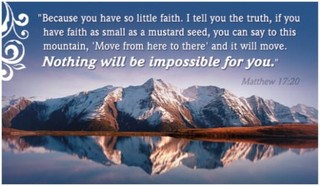- Recent Translations
- All Translations
Matthew 17:4
Share
Settings
Matthew 17:4 in Other Translations
Matthew 17:4 Meaning and Commentary
Then answered Peter and said unto Jesus
Which was, as Luke informs us, after he, and James, and John, awoke out of sleep; for it being night when Christ was transfigured, and they weary, were overpressed, and fell asleep on the mount, as they afterwards did in the garden with him: but when they were awaked, either by the talk of the men with Christ, or by the rays of brightness and glory, which darted from them, and especially from Christ, to their great surprise; they saw the glory that was upon him, and observed the two men that were with him, who appeared also in glorious forms; whom either by revelation, or the sequel of their discourse, they knew to be Moses and Elias: and just as these were taking their leave of Christ, Peter, charmed with such objects, and with such delightful company, and pleasant conversation, he had the happiness of hearing part of, addresses himself to Christ and says,
Lord, it is good for us to be here;
in this mountain, with thyself and such company; better than to be below among the throng and multitude, where nothing but misery and distress are to be seen, and noise and tumult heard; or it is better to be here, than to go to Jerusalem, and there suffer and die; the horror of which, is thought by some, still to abide on Peter's mind.
If thou wilt, let us make here three tabernacles:
tents, or booths, such as were made, at the feast of tabernacles, of boughs and branches of trees, to keep off heat, cold, and rains:
one for thee, and one for Moses, and one for Elias;
Luke adds, "not knowing what he said"; and Mark, "for he wist not what to say": the one representing him, as with the rapture and surprise, not himself; and the other, under the awe and dread of such majesty, as at the utmost loss what to say, agreeably to such a situation of things: not but that he knew what words he did deliver, and with what view; but he spake as a mistaken man, being ignorant of the design of this appearance; which was, not that this glory should continue, only that he should be an emblem and pledge of what was future; and besides, he was wrong in putting these two men upon an equal foot with Christ, each of them being to have a separate tabernacle as he; and he appeared to be quite out of the way, in proposing earthly tabernacles for glorified persons to dwell in, who had an house not made with hands, eternal in the heavens: moreover, as to the mystical sense, Moses and Elias, the law and the prophets, were not to be considered as in distinct apartments, and separate from Christ, but as agreeing with him, and fulfilled and swallowed up in him; who only, according to the voice that followed, was to be heard and attended to, and not they, as distinct from him.

